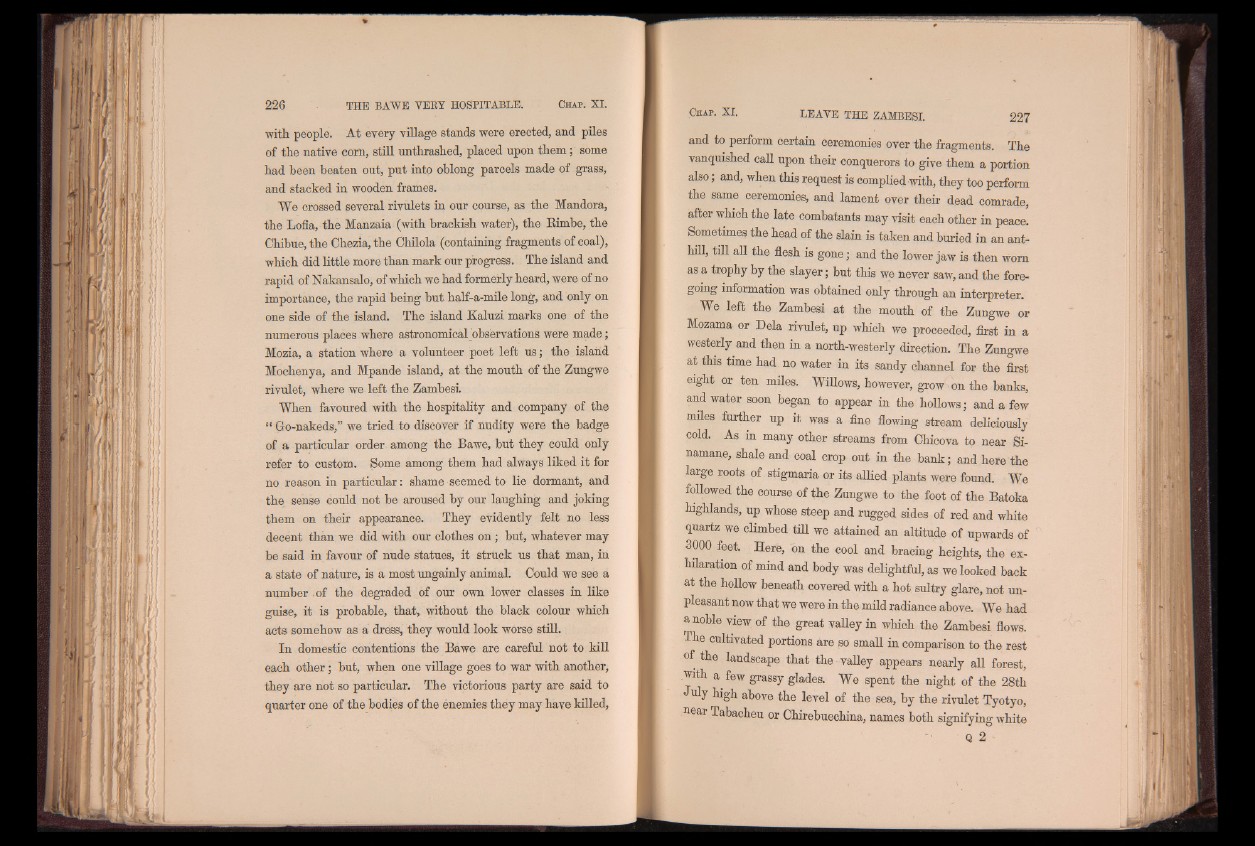
with people. At every village stands were erected, and piles
of the native corn, still unthrashed, placed upon them; some
had been beaten out, put into oblong parcels made of grass,
and stacked in wooden frames.
We crossed several rivulets in our course, as the Mandora,
the Lofia, the Manzaia (with brackish water), the Rimbe, the
Chibue, the Chezia, the Chilola (containing fragments of coal),
which did little more than mark our progress. The island and
rapid of Nakansalo, of which we had formerly heard, were of no
importance, the rapid being but half-a-mile long, and only on
one side of the island. The island Kaluzi marks one of the
numerous places where astronomical observations were made;
Mozia, a station where a volunteer poet left us; the island
Mochenya, and Mpande island, at the mouth of the Zungwe
rivulet, where we left the Zambesi.
When favoured with the hospitality and company of the
“ Go-nakeds,” we tried to discover if nudity were the badge
of a particular order among the Bawe, but they could only
refer to custom. Some among them had always liked it for
no reason in particular: shame seemed to lie dormant, and
the sense could not be aroused by our laughing and joking
them on their appearance. They evidently felt no less
decent than we did with our clothes o n ; but, whatever may
be said in favour of nude statues, it struck us that man, in
a state of nature, is a most ungainly animal. Could we see a
number .of the degraded of our own lower classes in like
guise, it is probable, that, without the black colour which
acts somehow as a dress, they would look worse still.
In domestic contentions the Bawe are careful not to kill
each other; but, when one village goes to war with another,
they are not so particular. The victorious party are said to
quarter one of the bodies of the enemies they may have killed,
and to perform certain ceremonies over the fragments. The
vanquished call upon their conquerors to give them a portion
also; and, when this request is complied with, they too perform
the same ceremonies, and lament over their dead comrade,
after which the late combatants may visit each other in peace.
Sometimes the head of the slain is taken and buried in an anthill,
till all the flesh is gone; and the lower jaw is then worn
as a trophy by the slayer; but this we never saw, and the foregoing
information was obtained only through an interpreter.
We left the Zambesi at the mouth of the Zungwe or
Mozama or Dela rivulet, up which we proceeded, first in a
westerly and then in a north-westerly direction. The Zungwe
at this time had no water in its sandy channel for the first
eight or ten miles. Willows, however, grow on the banks,
and water soon began to appear in the hollows; and a few
miles further up it was a fine flowing stream deliciously
cold. As in many other streams from Chicova to near Si-
namane, shale and coal crop out in the bank; and here the
large roots of stigmaria or its allied plants were found. We
followed the course of the Zungwe to the foot of the Batoka
highlands, up whose steep and rugged sides of red and white
quartz we climbed till we attained an altitude of upwards of
3000 feet. Here, on the cool and bracing heights, the exhilaration
of mind and body was delightful, as we looked back
at the hollow beneath covered with a hot sultry glare, not unpleasant
now that we were in the mild radiance above. We had
a noble view of the great valley in which the Zamhesi flows.
The cultivated portions are so small in comparison to the rest
of the landscape that the valley appears nearly all forest,
with a few grassy glades. We spent the night of the 28th
July high above the level of the sea, by the rivulet Tyotyo,
near Tabacheu or Chirebuechina, names both signifying white
Q 2